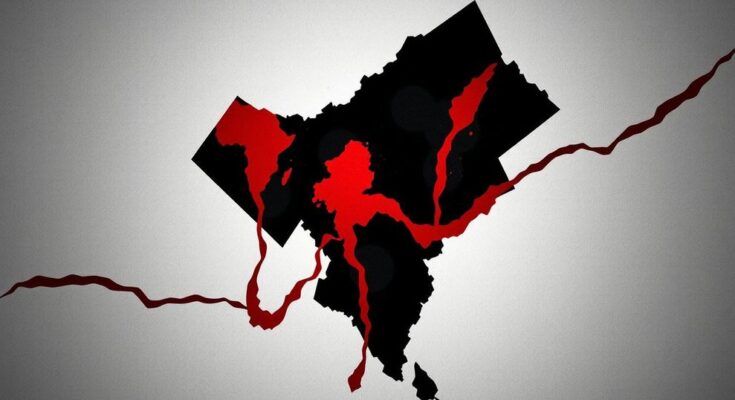Heavy clashes erupted in Goma, DR Congo, between government forces and M23 rebels, prompting fears among residents. The M23 claims control while government presence remains in parts of the city. The rebels’ advances have led to casualties, significant displacements, and calls for international intervention as the humanitarian crisis deepens.
A humanitarian crisis intensified in the Democratic Republic of Congo on Monday when the Rwanda-backed M23 rebel group engaged in fierce hostilities with government forces in Goma, the capital of North Kivu. Residents of Goma expressed their terror, reporting widespread bombardments. Taxi driver Safari Kanyagala Patrick noted, “We are surrounded; there is no place to go,” while citizens remained barricaded at home as fighting ensued throughout the day. Muzige Gakiza, another local, described the dire conditions, stating, “I can’t talk now, but the situation is dire, and we need help.”
It remains uncertain who controls Goma at this time. M23 spokesman Lawrence Kayuka claimed the city was liberated by rebel forces and urged Congolese military personnel to surrender, reassuring Goma’s residents to remain calm. However, journalist Jimmy Bakomera indicated that government troops continued to maintain a presence in parts of the city, indicating an ongoing clash for control.
According to a statement from the Uruguayan army, which supports the UN peacekeeping mission in Goma, M23 rebels are advancing against the Congolese military, leading to the defection of over a hundred Congolese soldiers. During an emergency UN Security Council meeting, Bintou Keita, head of the UN stabilization mission in Congo, highlighted that roads to Goma are blocked and M23 declared the airspace over the city closed, rendering the area practically besieged.
Over the past two days, three UN peacekeepers were killed and 11 injured. Additionally, a general managing North Kivu was reportedly killed last week as the M23 made territorial gains into South Kivu. The M23, primarily composed of Congolese Tutsis, previously seized Goma in 2012 for ten days before withdrawing amid international intervention. Their resurgence stirs fears of renewed violence in mineral-rich Congo, with an estimated 6 million deaths related to conflict since 1996. Currently, approximately 400,000 individuals have been displaced in North and South Kivu this year alone.
UN Secretary General António Guterres recently urged the Rwanda Defense Forces to cease their support for M23 and withdraw from Congo. In response to escalating violence, the U.S. Embassy in Kinshasa advised American citizens to leave North Kivu while borders remain accessible. The situation in Goma continues to evolve with ongoing military clashes and humanitarian concerns.
The Democratic Republic of Congo has historically faced significant turmoil, exacerbated by internal strife and external influences, particularly regarding ethnic tensions involving Tutsi and Hutu groups. The M23 rebel group, which emerged in 2012, has a history of seizing control of Goma. Recent support from Rwanda has reignited conflicts in the region, prompting urgent international responses and humanitarian concerns due to displacement and casualties.
The conflict between the M23 rebels and Congolese forces in Goma has escalated rapidly, leading to significant humanitarian crises and an uncertain security situation in the region. The situation requires immediate attention from international entities and underscores the fragility of peace in the Democratic Republic of Congo. Continued violence threatens not only stability but also the welfare of countless civilians caught in the crossfire.
Original Source: www.washingtonpost.com




